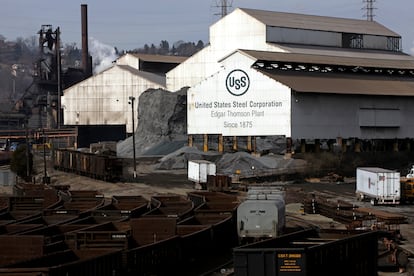What Biden and Trump (and Spanish Prime Minister Pedro Sánchez) agree on
What today is considered acceptable protectionism would have been scorned as economic nationalism a few years ago

I have often wondered what would have happened if a program like the Inflation Reduction Act, that macro stimulus package pushed by the United States to give momentum to the green transition, propelling American industry (Made in America) in the face of foreign products, had been passed by Donald Trump instead of Joe Biden. Or how the $8.5 billion in direct public aid, in addition to loans and tax breaks, which the Democrat has just granted Intel to set up microprocessor plants would have gone down in public opinion. Or what would have happened if Trump, and not Biden, had publicly and directly opposed an agreement for the purchase of the American company U.S. Steel by the Japanese company Nippon Steel, causing the American company’s shares to fall by up to 12% with his words alone.
The latter requires less imagination because it happened. In mid-March, the president of the United States shook the market when he publicly expressed his opposition to the Japanese company’s operation, despite coming from a firm from an ally country that has offered $14.9 billion for the iconic American steel company with 22,000 workers (its headquarters located in Pennsylvania, a crucial state in the November presidential elections).
“It is important that we maintain strong American steel companies powered by American steel workers,” Biden said on March 15, in a statement about which one could play a guessing game of who said what among politicians of diverse profiles. A couple of months earlier, Republican Donald Trump said that, if he won the election and became president again, he would block the transaction immediately.
Biden and Trump do not even agree on where the sun rises, but the offer that a foreign industrial giant made on a legendary U.S. manufacturing firm managed to align them, each in his own way; it is a sign of the times. Last week, Brussels succeeded in getting a Chinese railway company, CRRC Qingdao Sifang Locomotive, to withdraw a public bid in Hungary after opening an investigation for illegal subsidies.
In Spain, the government has publicly expressed its discomfort with the offer that the Hungarian company Magyar formalized yesterday for the emblematic train company Talgo, amid suspicions that it has ties to Russia. It has also opted to return to the telecommunications company Telefónica, 26 years after its privatization, as a reaction to the entry of STC, the provider controlled by the Saudi sovereign wealth fund, into the company.
Japan’s offer is not suspected of having ties to Russia, nor does it come from a regime like that of Mohammed bin Salman, but it strikes a chord with citizens in the United States (and half of the world) today. It is hard to imagine that the Endesa — a Spanish multinational electric company — takeover and counter-takeover affair would have had the same outcome today as it did in 2009: it became a subsidiary of an Italian company (Enel) that sold its entire Latin American business.
What would have been scorned as economic nationalism 15, 10 or even five years ago is now considered acceptable protectionism of each country’s strategic interests, a trend exacerbated by the pandemic, geopolitical tensions and the impoverishment of the middle class, partly due to the deindustrialization of economies.
Many in the United States and Europe have been shaking their heads. Biden can be criticized for holding back an operation with purely sentimental arguments, since Nippon Steel promised to keep jobs and production in the United States and the American company is not what it used to be: it has gone down from 340,000 workers during World War II to just over 20,000 and is the third largest in the country, while the Japanese firm is the fourth largest in the world. But it is legitimate to think and react to the defensive steps that so many countries have taken, to the controlling shareholders you want in companies that manage your most basic networks and services, and to remember and fear the old factories of the American Midwest that have turned into empty shells.
Sign up for our weekly newsletter to get more English-language news coverage from EL PAÍS USA Edition
Tu suscripción se está usando en otro dispositivo
¿Quieres añadir otro usuario a tu suscripción?
Si continúas leyendo en este dispositivo, no se podrá leer en el otro.
FlechaTu suscripción se está usando en otro dispositivo y solo puedes acceder a EL PAÍS desde un dispositivo a la vez.
Si quieres compartir tu cuenta, cambia tu suscripción a la modalidad Premium, así podrás añadir otro usuario. Cada uno accederá con su propia cuenta de email, lo que os permitirá personalizar vuestra experiencia en EL PAÍS.
¿Tienes una suscripción de empresa? Accede aquí para contratar más cuentas.
En el caso de no saber quién está usando tu cuenta, te recomendamos cambiar tu contraseña aquí.
Si decides continuar compartiendo tu cuenta, este mensaje se mostrará en tu dispositivo y en el de la otra persona que está usando tu cuenta de forma indefinida, afectando a tu experiencia de lectura. Puedes consultar aquí los términos y condiciones de la suscripción digital.









































